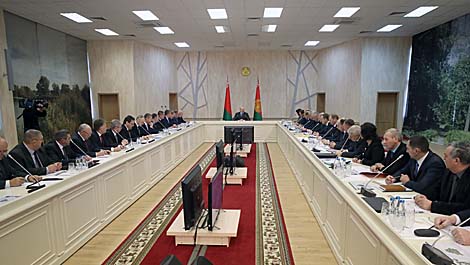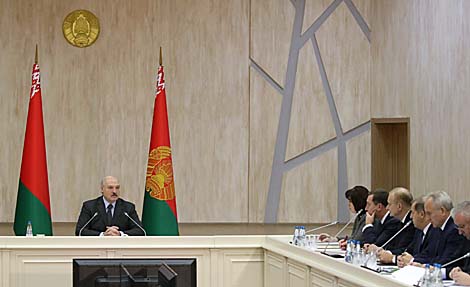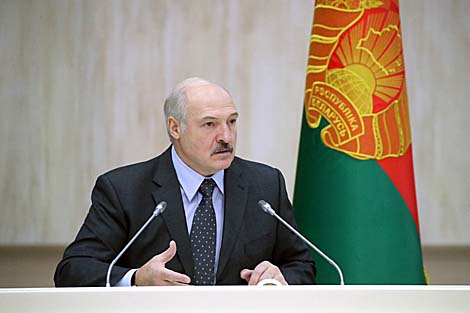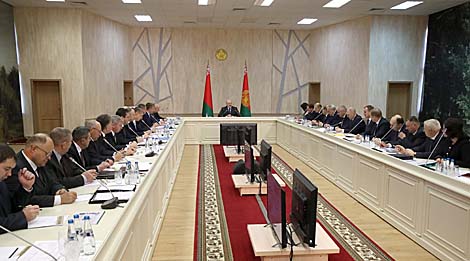Opinions & Interviews
Belarus president dissatisfied with state of affairs in flax industry

ORSHA, 30 November (BelTA) – In order to get the flax industry operating effectively, it is necessary to, first and foremost, objectively determine the problems. Belarus President Alexander Lukashenko made the statement during the government conference held in Orsha on 30 November to discuss the development of flax farming and flax processing, BelTA has learned.
The head of state said: “We have been postponing this government conference for maybe a year. We cannot postpone it any longer. This year has been a revelation as far as flax and colza farming is concerned. We will talk about colza later. Today we have to objectively determine the problems with the flax industry in order to ensure its effective operation at last. This is why I need well-argued, sincere, and honest answers to all questions. Don’t try to dazzle me with reports of your heroic work in this field with your tail between your legs.”
The head of state noted that attention paid to the flax industry is well-deserved. Belarus is one of the leading producers of flax fiber. Apart from that, flax is the only annually reproducible raw material the textile industry needs. These days Belarusian companies make specialized machines to cultivate and harvest flax while linen mills are busy exploring new applications for flax fiber, flax chaff, and flax seeds.
 “We are now regaining ground in flaxseed oil production. We could only import it several years ago,” stated Alexander Lukashenko.
“We are now regaining ground in flaxseed oil production. We could only import it several years ago,” stated Alexander Lukashenko.
Alexander Lukashenko reminded that decisions were made several years ago to choose the flax farming technology, the optimal time for sowing and harvesting flax. Decisions were also made on the operation of Orsha Linen Mill and on retooling linen mills and flax farming enterprises.
“But the situation in the flax industry is far from rosy. Yes, we have to admit there has been some very little growth and dynamics in the right direction. Not only because the market helped us and there is demand, but also because agricultural enterprises started paying more attention to flax. But we’ve gained so very little,” stressed the head of state.
 According to Alexander Lukashenko, he is concerned by the fact that the same issues crop up year after year. “Flax farmers and flax processing enterprises encounter problems but neither the oblast governors nor the central government has offered effective solutions,” he noted.
According to Alexander Lukashenko, he is concerned by the fact that the same issues crop up year after year. “Flax farmers and flax processing enterprises encounter problems but neither the oblast governors nor the central government has offered effective solutions,” he noted.
Alexander Lukashenko wondered why the technical regulations on choosing the appropriate soil and cultivating it are not observed, what impedes the timely sowing operations, why poor quality seeds are used. “These are matters of agriculture, of agricultural enterprises,” said the head of state.
The president was also interested in what had been done in Belarus to create machines for the entire process flow and why flax farming enterprises still lack the necessary machines for flax growing and harvesting. “What prevents our linen mills from operating at full capacity? Why can’t they operate effectively? Why was their retooling limited to the replacement of worn-out parts and machines? What are the reasons behind the failure to deliver the amount of flax fiber the state wants to buy?” Alexander Lukashenko raised a number of problems.
 Alexander Lukashenko pointed out that Russia and China buy flax fiber in Belarus and make products, which sell better than products of Belarusian origin. “Where are the technologies and specialists, who should promote Belarusian flax products?” wondered the head of state.
Alexander Lukashenko pointed out that Russia and China buy flax fiber in Belarus and make products, which sell better than products of Belarusian origin. “Where are the technologies and specialists, who should promote Belarusian flax products?” wondered the head of state.
Alexander Lukashenko stated that $212 million has been invested in the development of Orsha Linen Mill since 2007. He wondered what impedes the normal growth of the company. “We’ve decided today that the company can add another 30-35%. They have the spare capacity,” stressed the head of state.







 print version
print version make home page
make home page add to bookmarks
add to bookmarks

